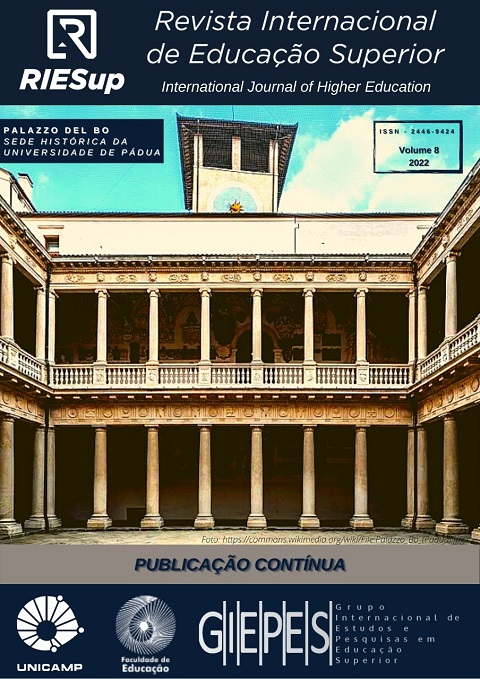Abstract
Higher Education Institutions (HEIs), as agents acting in society, play an indispensable role in the formation of students, because in addition to the technical knowledge they must offer, they must also focus their work on the development of competences and skills aiming to transform students into protagonist beings. and proactive in the context in which they are inserted and in life itself. The present work is an original work and has as technical procedures the bibliographical, documentary and experimental research. It is an applied research of empirical study and quantitative approach. The aim of this paper is to verify if an online software that maintains a database of higher education issues can assist the teacher in diagnosing competencies and skills that need to be reinforced. Through research on the use of tools that positively impact the students' teaching-learning process, it was found that these tools can serve as an aid and improvement in the teaching-learning process. To achieve the objective of the work, a web system was developed for the centralization of questions with the same structure as the Enade (National Student Performance Examination) questions. The IFCE Question Bank was validated through an online questionnaire that aimed to verify the veracity of the tool against its objectives and the intention of its use in the classroom.
References
ABEGG, Ilse; DE BASTOS, Fábio da Purificação; MÜLLER, Felipe Martins. Ensino-aprendizagem colaborativo mediado pelo wiki do Moodle. Educar em Revista, n. 38, p. 205-218, 2010.
BRASIL. Exame nacional de cursos – enc. 1995. Disponível em: http://www.planalto.gov.br/ccivil_03/leis/L9131.htm. Acesso em: 30 de Nov de 2019.
BRASIL. Sistema nacional de avaliação da educação superior - Sinaes. 2004. Disponível
em: http://www.planalto.gov.br/ccivil_03/_ato2004-2006/2004/lei/l10.861.htm. Acesso em: 30 de Nov de 2019.
BRASIL. Cálculo da nota final do exame nacional de desempenho dos estudantes
(enade). 2019. Disponível em: http://download.inep.gov.br/educacao_superior/enade/
notas_tecnicas/2019/nota_tecnica_n20-2019_CGCQES-DAES_calculo_NF_Enade.
pdf. Acesso em: 30 de Nov de 2019.
BRYER, Jason; SPEERSCHNEIDER, Kimberly; BRYER, Maintainer Jason. Package ‘likert’. 2016. Acesso em: 30 de Nov de 2019.
CESPE. A aplicação de provas em computador. 2013. Disponível em: http://www.cespe.unb.br/jornalcespe/pdfs/023.pdf. Acesso em: 30 de Nov de 2019.
DE BRITO, Márcia Regina F. O SINAES e o ENADE: da concepção à implantação. Avaliação-Revista da Avaliação da Educação Superior, v. 13, n. 3, 2008.
ENADE. Enade. 2019. Disponível em: http://inep.gov.br/enade. Acesso em: 06 mar 2019.
GOOGLE. Google forms. 2019. Disponível em: https://www.google.com/forms/about/. Acesso em: 30 de Nov de 2019.
INEP. Inep. 2019. Disponível em: http://inep.gov.br/sinaes. Acesso em: 30 de Nov de 2019.
KIRCHNER, Kathrin; RAZMERITA, Liana. Collaborative learning in the cloud: a cross-cultural perspective of collaboration. In: Proceedings of the 26th ACM Conference on Hypertext & Social Media. ACM, 2015. p. 333-336.
LUCKESI, Cipriano Carlos. O que é mesmo o ato de avaliar a aprendizagem. Revista Pátio, v. 12, p. 6-11, 2000.
MANSEIRA, Paulo Rogério Pires; MISAGHI, Mehran. Proposta de ferramenta para uso abrangente de testes adaptativos computadorizados na educação a distância. In: Anais do III CONGRESSO BRASILEIRO DE ENGENHARIA DE PRODUÇÃO. 2013.
MARCONI, M. de A.; LAKATOS, E. M. Fundamentos de metodologia científica. 8. ed.
São Paulo: Atlas, 2017.
MASCARENHAS, Sidnei Augusto et al. Metodologia científica. 2012.
MEC. Conheça a conaes. 2019. Disponível em: http://portal.mec.gov.br/conaes-comissao-nacional-de-avaliacao-da-educacao-superior/conhea-a-conaes. Acesso em: 06 de mar 2019.
R. The r project for statistical computing. 2019. Disponível em: https://www.r-project.
org/. Acesso em: 15 de Jul de 2019.
RSTUDIO. Rstudio open source and enterprise-ready professional software for r. 2019.
Disponível em: https://www.rstudio.com/. Acesso em: 20 de Out de 2019.
SOBRINHO, José Dias. Avaliação e transformações da educação superior brasileira (1995-2009): do provão ao SINAES. Avaliação: Revista da Avaliação da Educação Superior, v. 15, n. 1, 2010. Disponível em: http://submission.scielo.br/index.php/aval/article/view/26656/2931. Acesso em: 06 mar 2019.
VERHINE, Robert Evan; DANTAS, Lys Maria Vinhaes; SOARES III, José Francisco. Do Provão ao ENADE: uma análise comparativa dos exames nacionais utilizados no Ensino Superior Brasileiro. 2006. Acesso em:
VICKERS, Richard et al. Social media and collaborative learning: hello Scholr. In: Proceedings of the 18th International Academic MindTrek Conference: Media Business, Management, Content & Services. ACM, 2014. p. 103-109. Acesso em: 06 de mar 2019.
WAZLAWICK, Raul. Metodologia de pesquisa para ciência da computação. Elsevier Brasil, 2017.

This work is licensed under a Creative Commons Attribution 4.0 International License.
Copyright (c) 2020 Revista Internacional de Educação Superior


